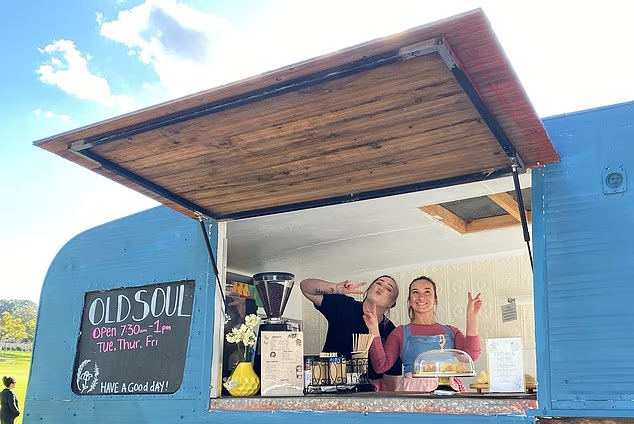
Rosie Miller had dreamed of creating more than just a café in south Perth.
She had imagined a place where families could gather, neighbours could connect, and the local park could come alive with laughter and the aroma of fresh coffee.
But after just two weeks, her mobile café was forced to close, leaving the community stunned.
The City of Cockburn council shut down Old Soul Coffee Co last week, ending its brief operation in Yangebup Primary School’s car park.
Ms Miller, 34, ran the café with barista Emma Hopkins and said the caravan had quickly become a hub for locals seeking coffee and conversation.
'The sense of community and the coming together of families out in the park was really lovely. Isolated members of the community were coming down for a coffee and chat, people getting out into the open space.'
The café had been designed to meet a shortage of local options and bring life to an area plagued by a pervasive drug culture.
They also sourced as much local produce as possible, encouraged reusable cups with a 50cent discount, and cleaned up litter before trading.
'We had hoped to start stocking picnic mats for customers to use. We take all our rubbish and waste water home. We were cleaning up the area of litter before trading,' Ms Miller said.
Locals agreed the caravan had become a rare social hub.
Despite the support, the council said the café could not operate without a valid licence and permission from the state school, and even then it would breach rules prohibiting trade within 1km of a similar business.
'To the City of Cockburn, a "like business" is one which has a coffee machine,' Ms Miller said.
'The IGA, local deli and petrol station 1.2km up the road has these machines [and] one is an instant machine. The local IGA has an unused machine and its primary income is not serving coffee!'
Ms Miller criticised the council for favouring big corporations over small community initiatives.
'There's so much potential for small business to thrive but we are getting held back by council who are more interested in building Starbucks and childcare centres,' she said.
She had planned to put any proceeds toward a community garden and hoped to continue fighting for the chance to trade outdoors.
'The options I'm left with are perhaps fighting the council for a spot on council land 100m down from the carpark, which they still aren't keen on,' she said.
The council defended its decision, insisting it welcomed public initiatives while prioritising safety.
'The City of Cockburn actively welcomes and supports community-led initiatives,' said Dan Arndt, director of sustainable development and safety.
'We welcome further discussion on identifying appropriate locations for mobile food vendors in the area. The city acknowledges the interest from members of the community in supporting local mobile food vendors and creating vibrant public spaces.'
'Increased traffic and parking congestion during school hours pose potential risks to students and families,' he added.
'[But] standards prohibit stallholders from trading within 1km of any shop, trader, or permanent place of business that sells similar goods, wares, merchandise, or services.'
Essential Permits for Coffee Van Operators
Food business licence from local council
Mobile food business registration
Council permit for operating in public areas
Food safety certificates
Vehicle roadworthy and insurance
Separate consent for each operating location
Old Soul Coffee Co faces $150 fines for trading without permits, but locals and the café owner remain determined to see the project continue.
What This Means For You
Old Soul Coffee Co’s brief existence highlights how vital small, local businesses are for community life.
For many over 60, neighbourhood cafés are more than places to grab a coffee—they’re spaces to connect, share stories, and feel part of a community. When regulations favour big corporations over these local hubs, it’s everyday people who lose out. This story is a reminder of why supporting and speaking up for local businesses matters.
Losing such a local hub so quickly raises the question—how can small businesses truly thrive when regulations so often outweigh community benefit?







